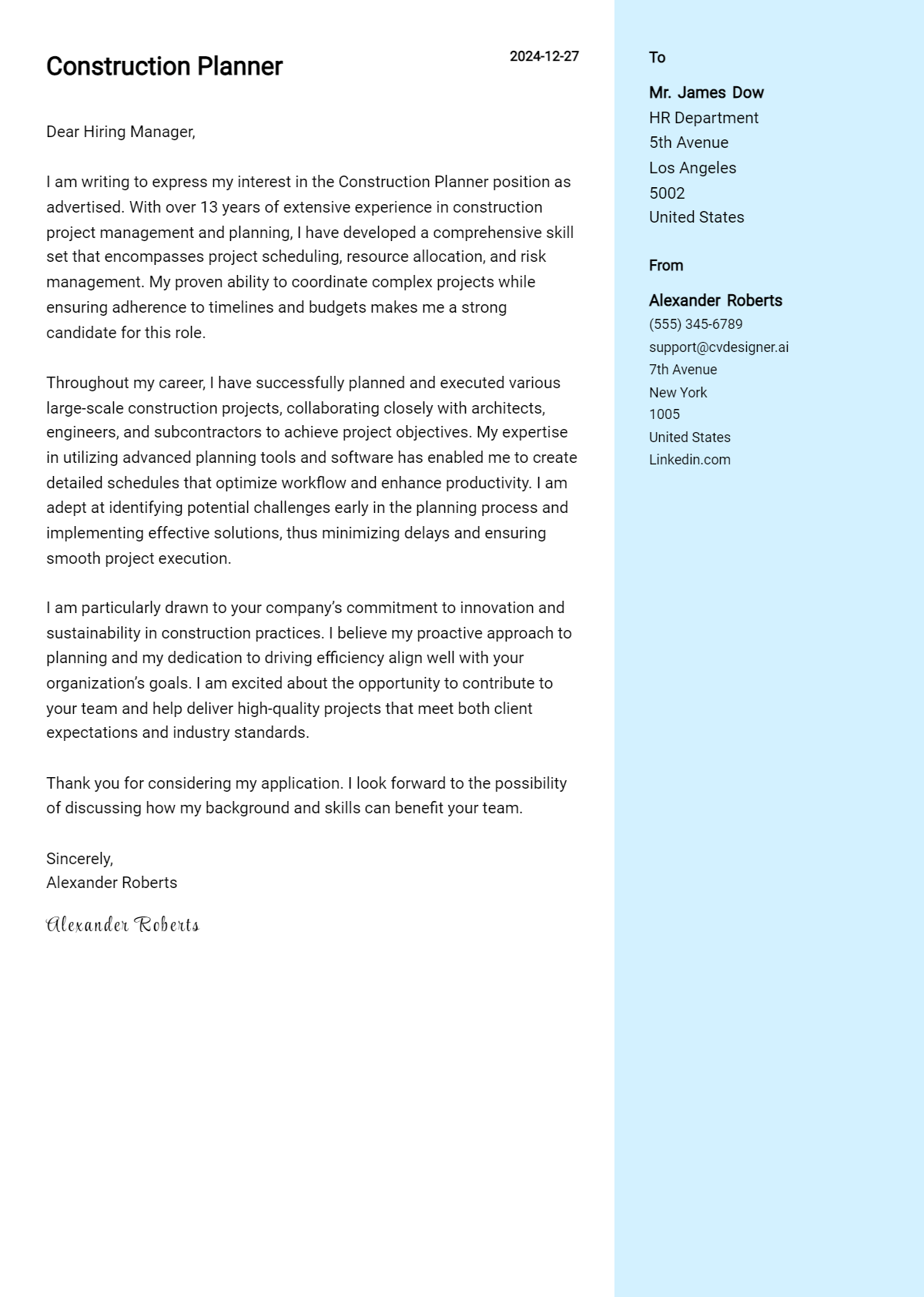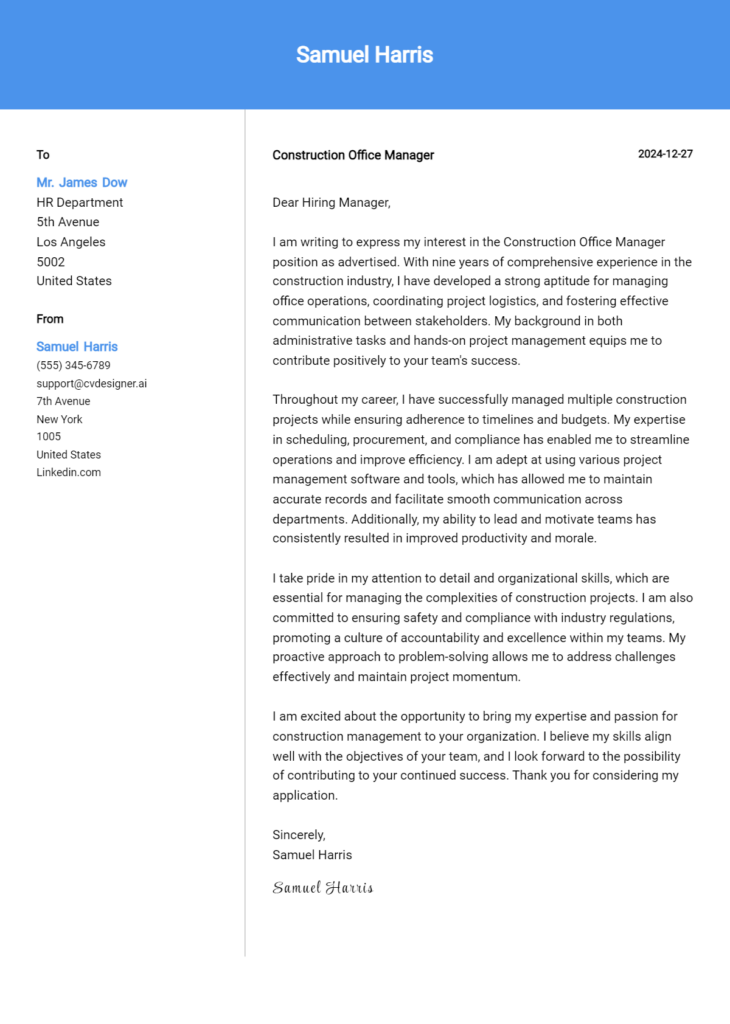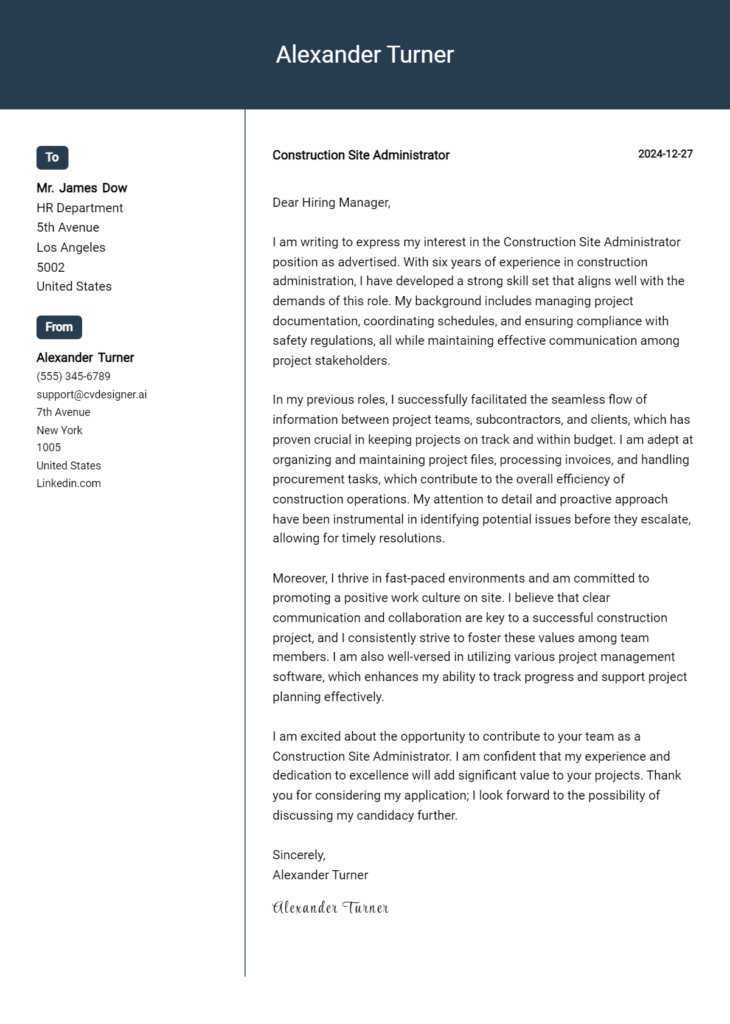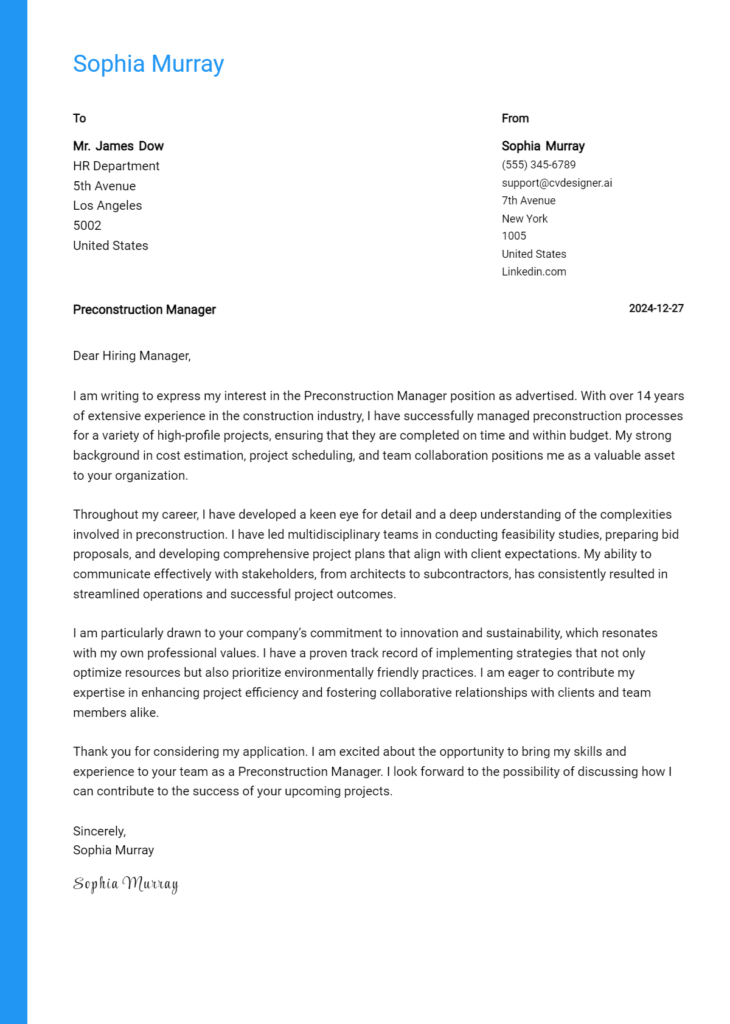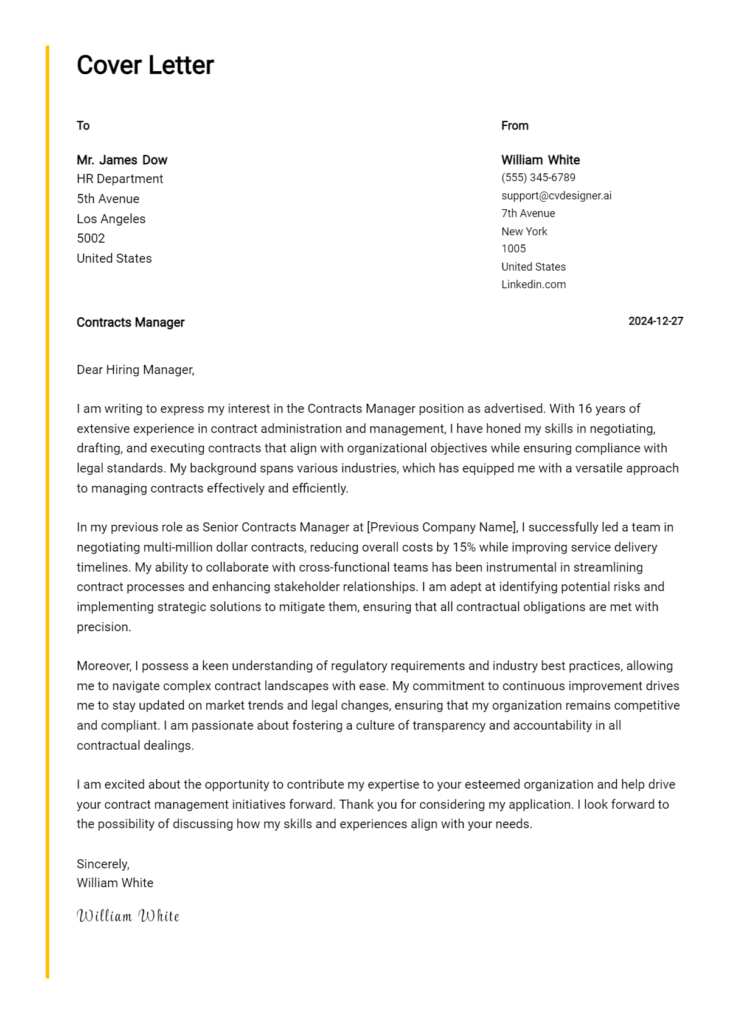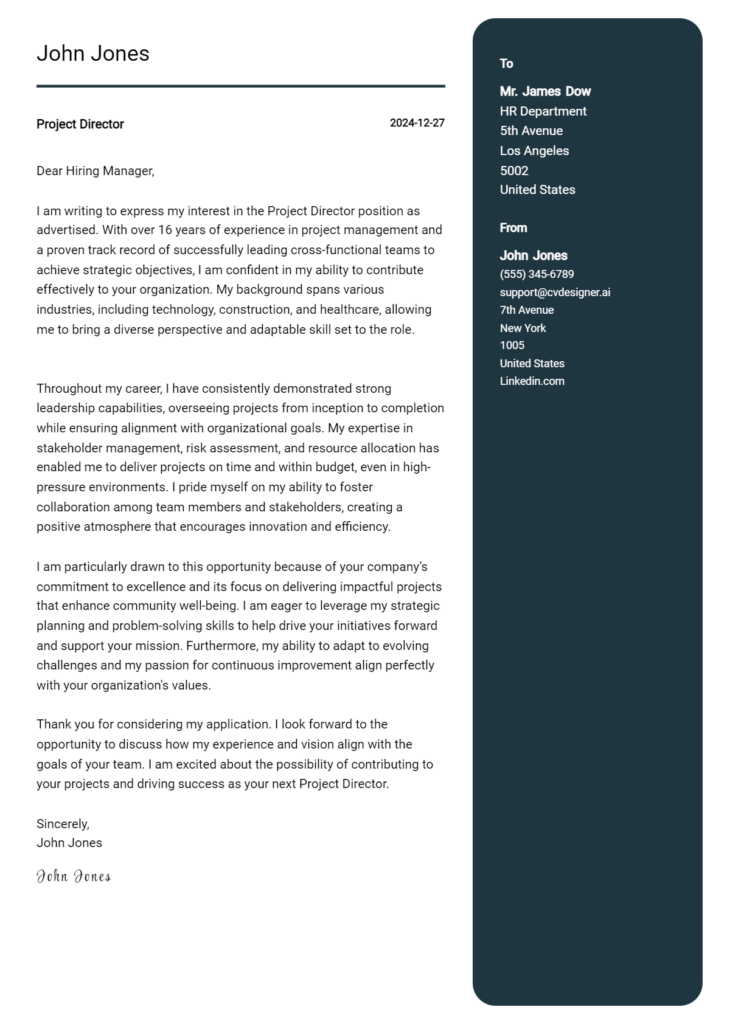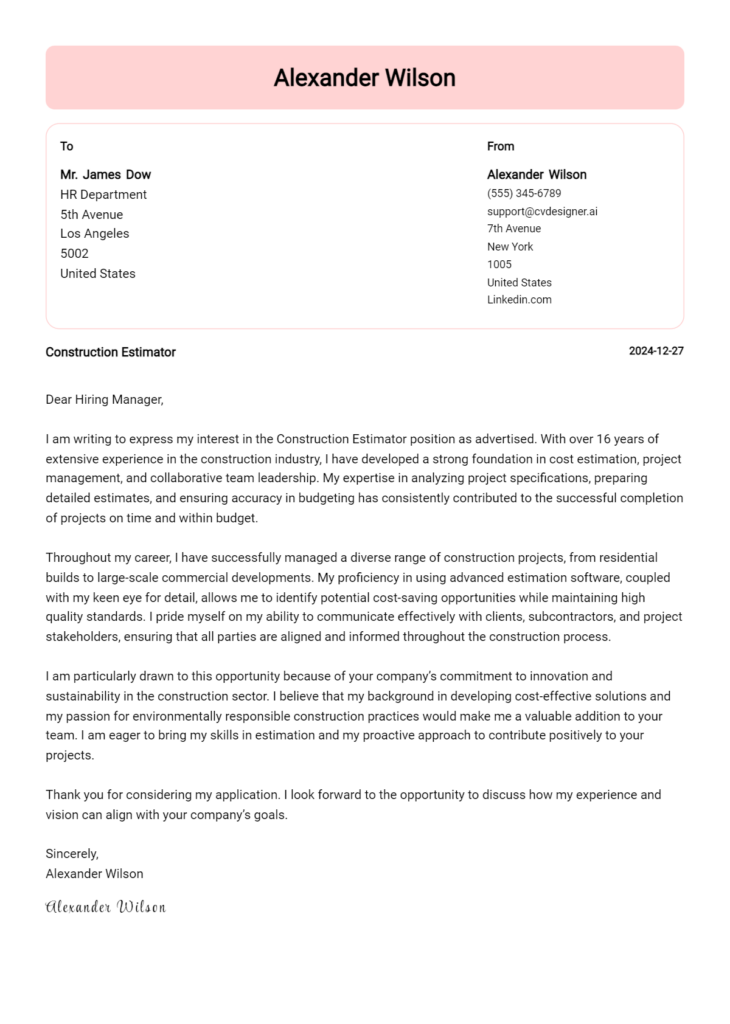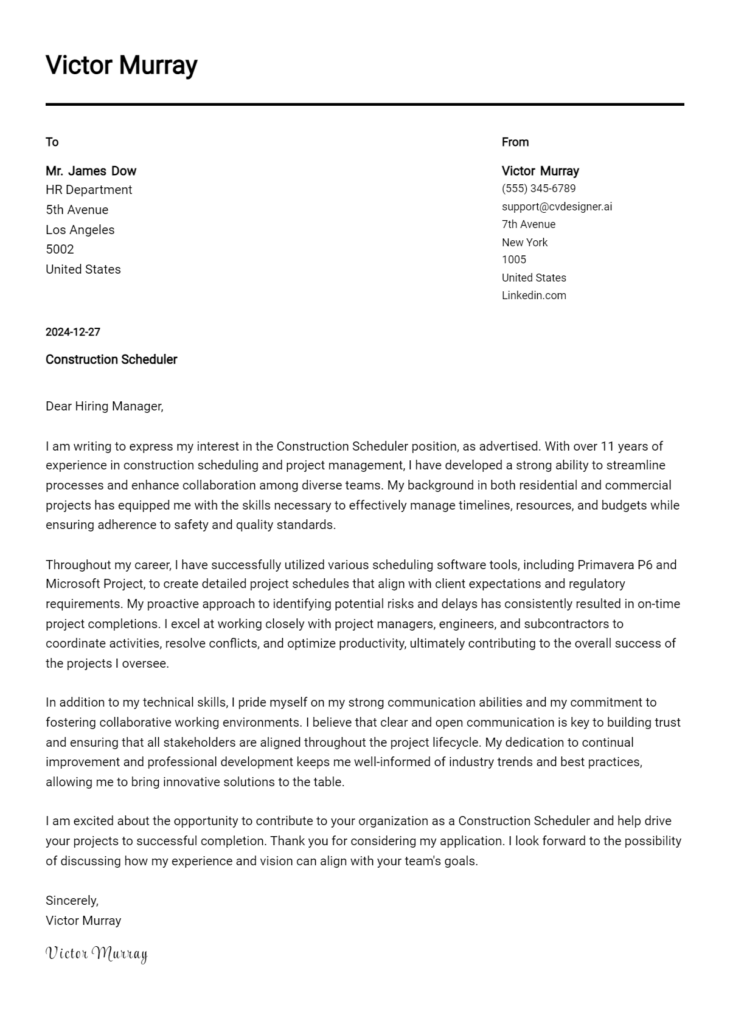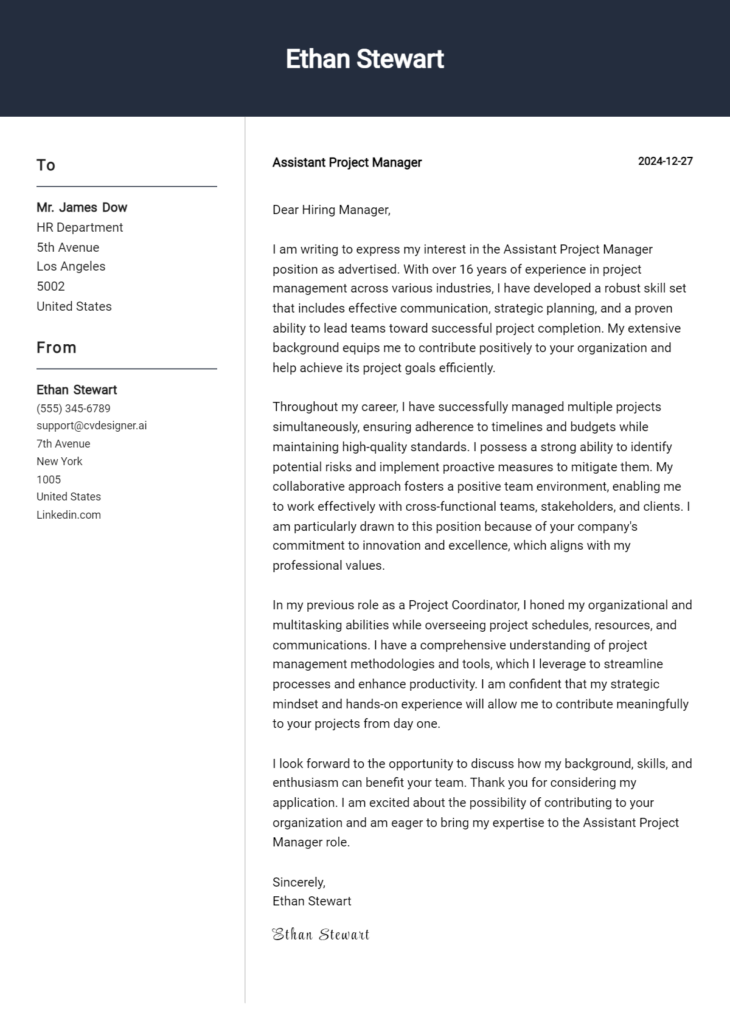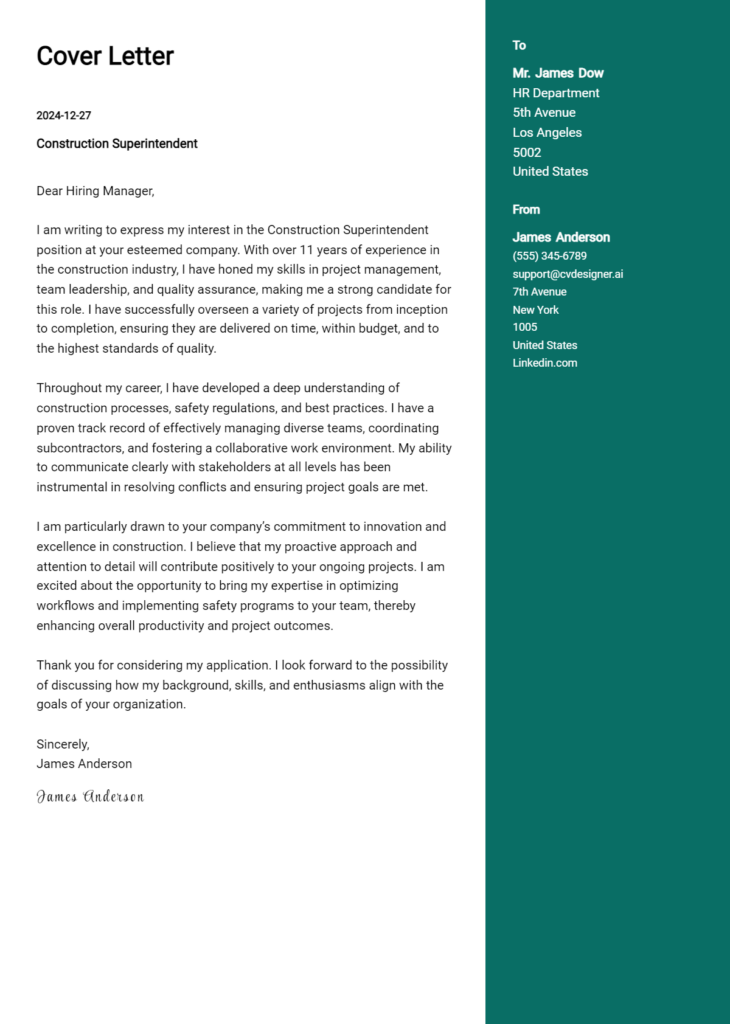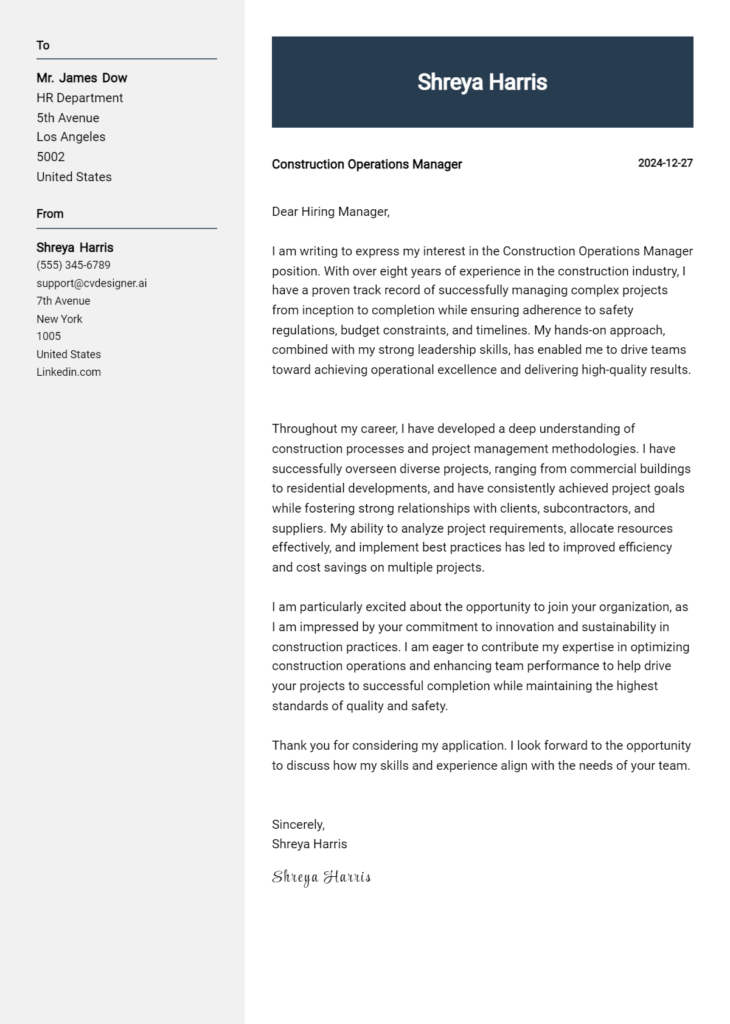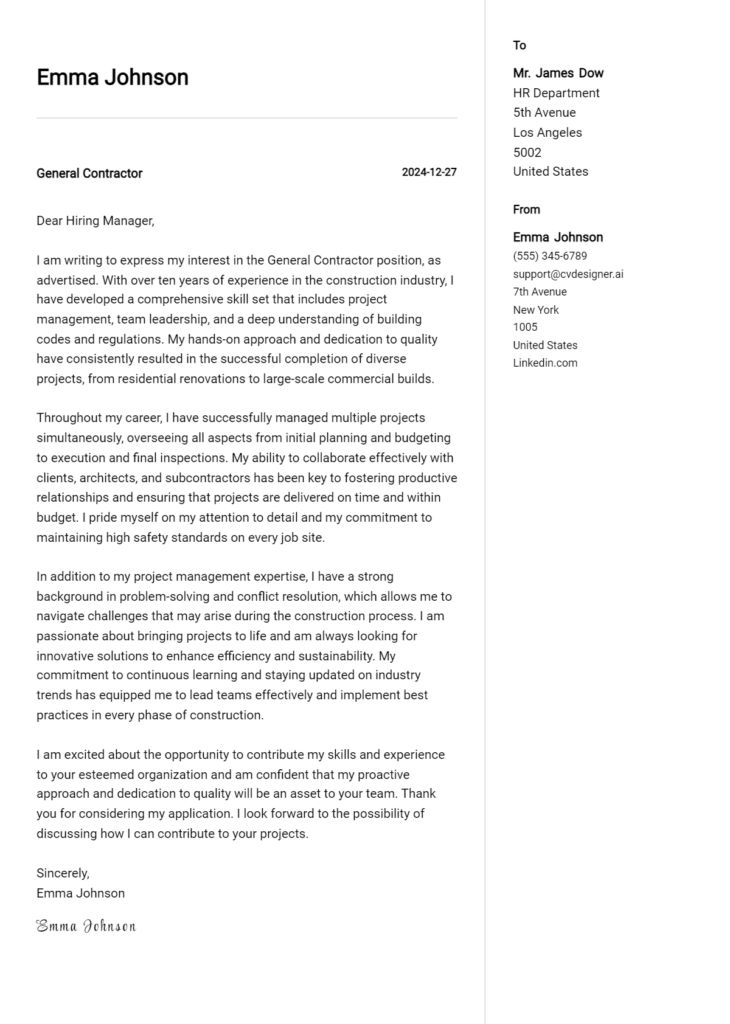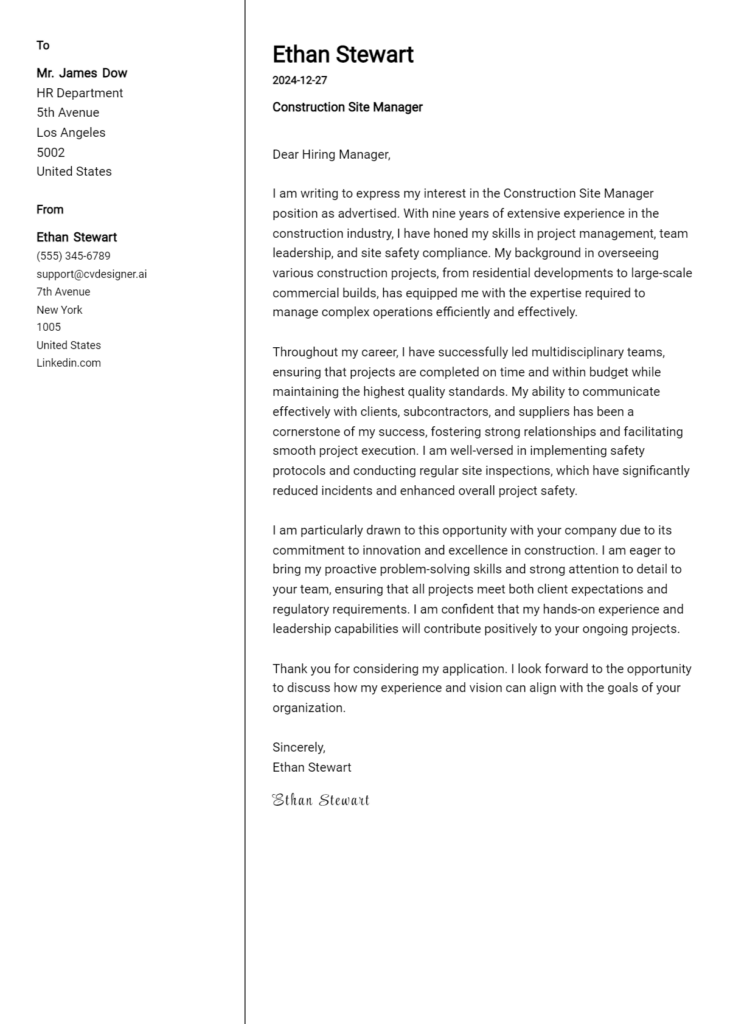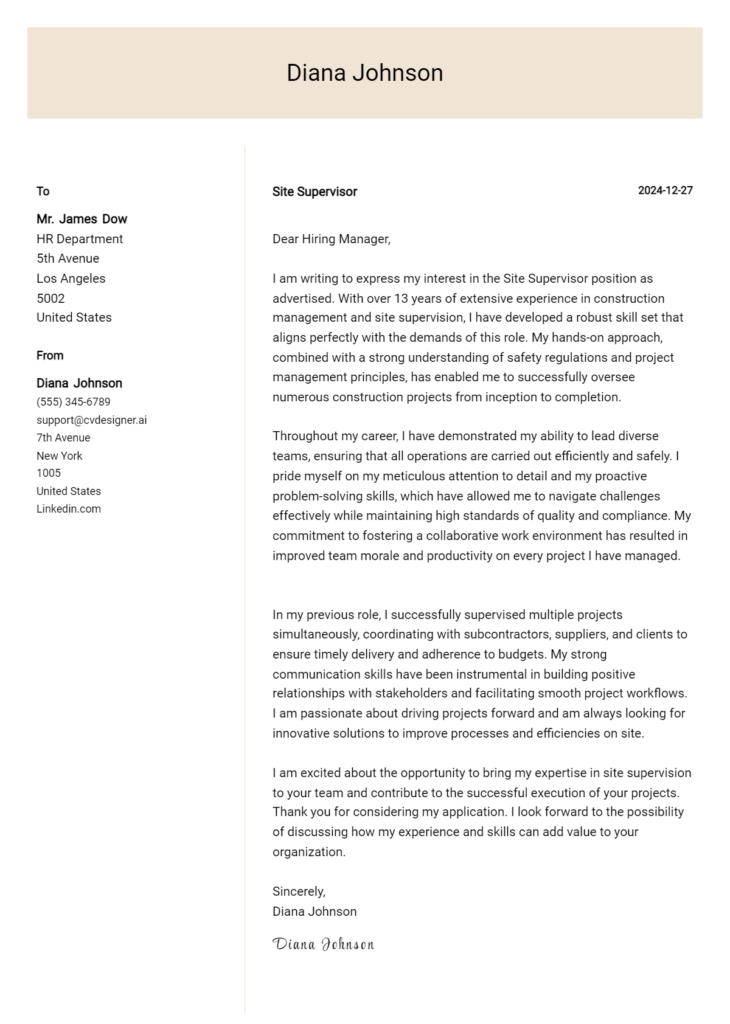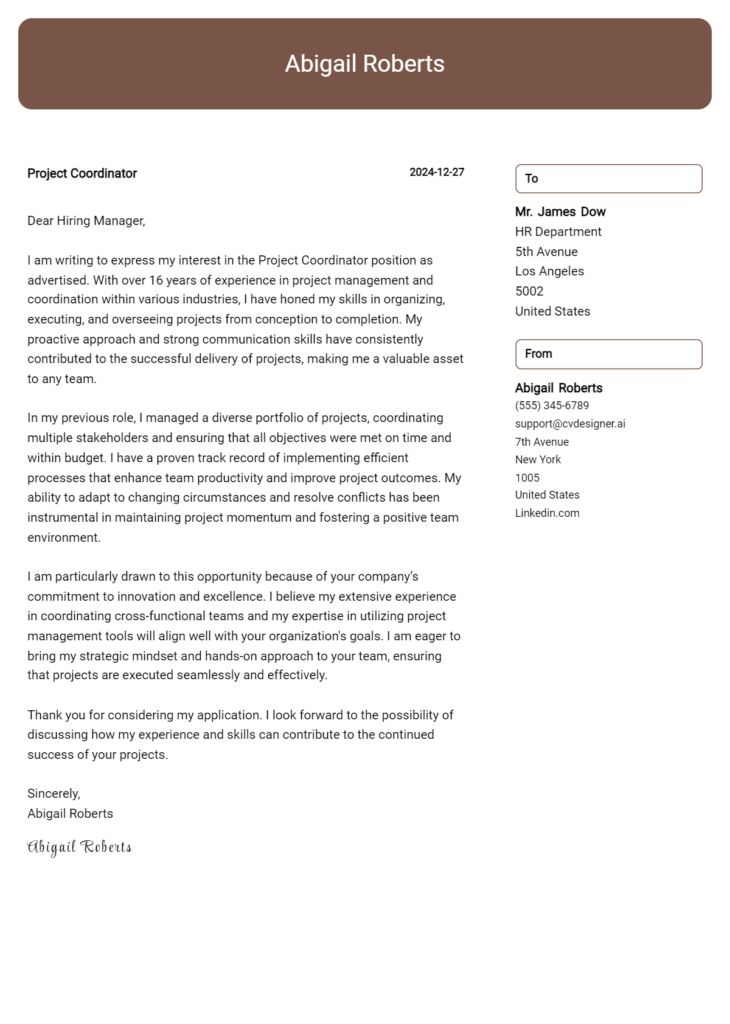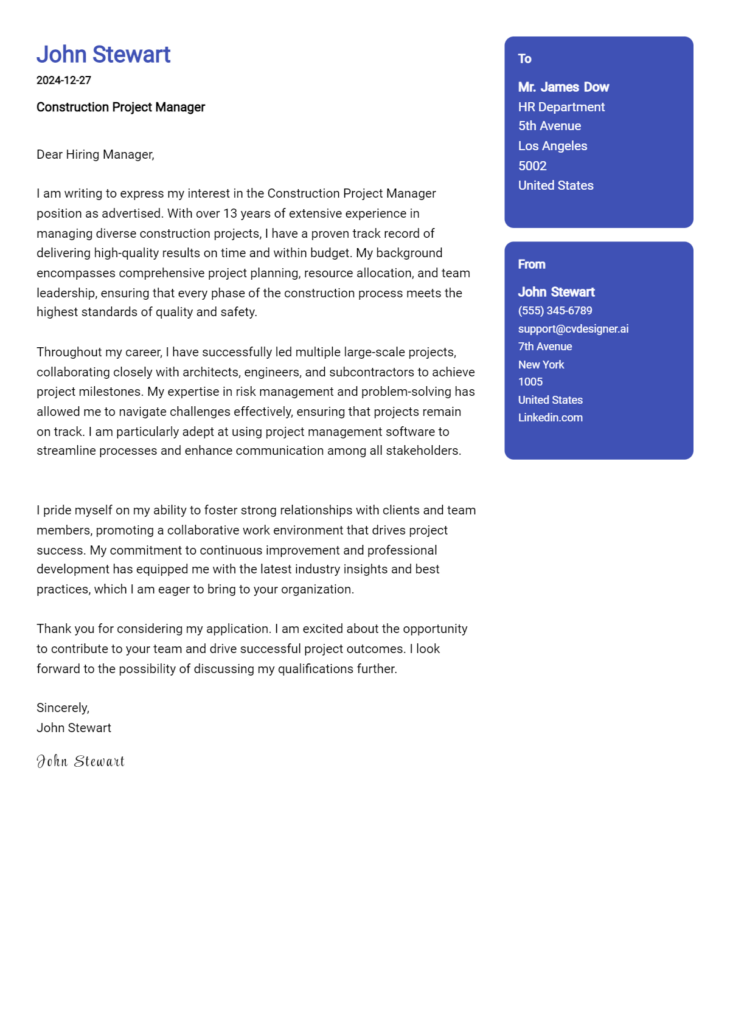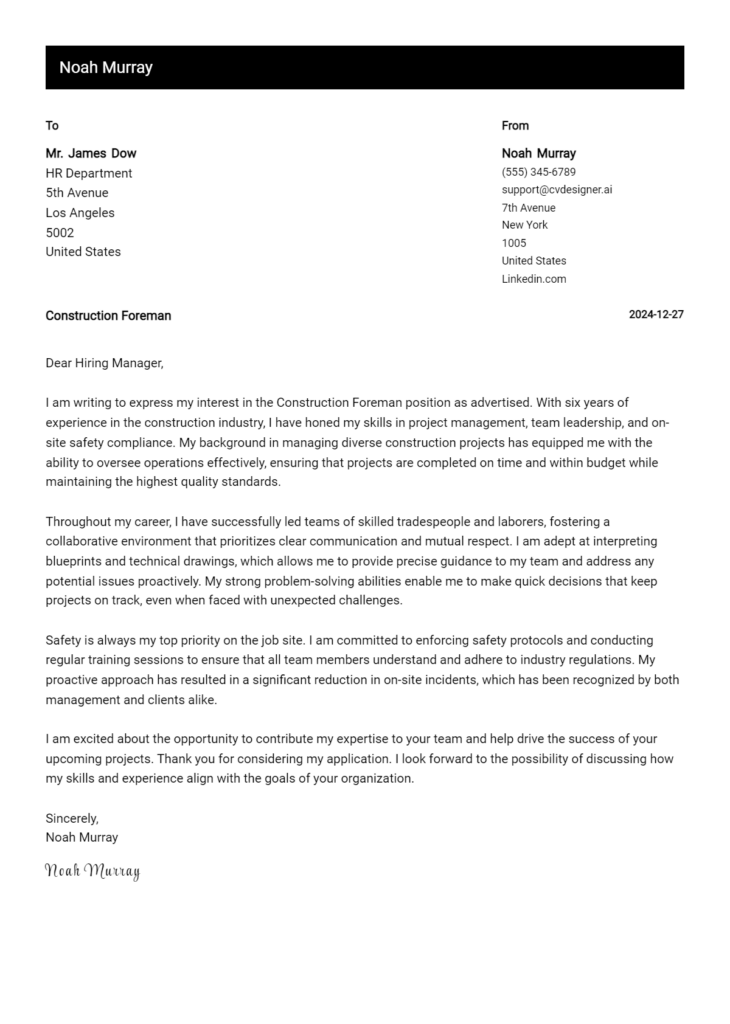Construction Planner Cover Letter Examples
Explore additional Construction Planner cover letter samples and guides and see what works for your level of experience or role.
How to Format a Construction Planner Cover Letter?
Crafting a well-structured cover letter is crucial for a Construction Planner, as it serves as your first opportunity to demonstrate your project management skills and attention to detail. The way you format your cover letter not only reflects your professionalism but also showcases your ability to organize information effectively—an essential trait in construction planning. A clear, concise, and visually appealing cover letter can capture the hiring manager's attention and set you apart from other candidates vying for the position.
In this guide, we'll discuss how to structure your cover letter and provide insights specific to construction planning that will help you create a compelling document.
We will focus on the essential components of a professional cover letter, including:
- Cover Letter Header
- Cover Letter Greeting
- Cover Letter Introduction
- Cover Letter Body
- Cover Letter Closing
Each section plays a vital role in highlighting your qualifications and expertise in construction planning. Let’s break down each part and explain how to make your cover letter stand out.
Importance of the Cover Letter Header for a Construction Planner
The header of a cover letter is a critical component that sets the tone for the entire document. For a Construction Planner, clarity and professionalism in the header are essential as they provide the first impression to potential employers. A well-structured header should include your contact information, the date, and the recipient's details, ensuring that all necessary parties can easily connect. This attention to detail not only reflects your organizational skills but also showcases your ability to communicate effectively, which is crucial in the construction industry.
Here’s how to craft a strong header versus a weak one:
Strong Example
John Doe 123 Main Street City, State, Zip (123) 456-7890 johndoe@email.com October 1, 2023 Hiring Manager ABC Construction Company 456 Industry Road City, State, Zip
Weak Example
John 123 St (123) 456-7890 10/1/23 To Whom It May Concern
The Importance of the Cover Letter Greeting
The greeting of your cover letter serves as the first impression you make on the hiring manager, setting the tone for the rest of your application. A well-crafted greeting not only demonstrates professionalism but also adds a personal touch by addressing the recipient directly. This initial connection can significantly influence how your cover letter is received. To avoid sounding generic, take the time to research the hiring manager's name and use it in your greeting. This effort shows initiative and genuine interest in the position. For example, instead of starting with "To Whom It May Concern," using a specific name can create a more engaging and respectful introduction.
Strong Example
Dear Mr. Johnson,
Weak Example
To Whom It May Concern,
The Importance of a Well-Crafted Cover Letter Introduction for a Construction Planner
A well-crafted cover letter introduction is crucial for a Construction Planner, as it sets the tone for the entire application and provides an opportunity to make a memorable first impression. This opening paragraph should not only capture the hiring manager's attention but also convey the candidate's genuine interest in the role. Moreover, it should briefly highlight key skills or achievements that align with the job requirements, showcasing the candidate's suitability for the position. A compelling introduction can differentiate a candidate from others, making it essential to invest time and thought into crafting this section.
Strong Example
Dear [Hiring Manager's Name], I am excited to apply for the Construction Planner position at [Company Name], as I have long admired your commitment to innovative and sustainable building practices. With over seven years of experience in construction management and a proven track record of successfully coordinating multi-million dollar projects, I am eager to bring my expertise in resource allocation and strategic planning to your esteemed team. My recent project, which reduced costs by 20% while improving completion time, stands as a testament to my ability to deliver results under pressure.
Weak Example
To Whom It May Concern, I am writing to apply for the Construction Planner job. I think I would be a good fit because I have some experience in construction. I worked on a few projects, but I’m not sure how much I saved or improved things. I hope you consider my application.
Purpose of the Cover Letter Body for a Construction Planner
The cover letter body serves as a critical platform for a Construction Planner to convey their skills, experiences, and overall value to a potential employer. It allows the candidate to highlight specific projects or accomplishments that demonstrate their expertise in project management, budgeting, and resource allocation. By providing concrete examples, applicants can illustrate their ability to overcome challenges and deliver results, which is essential in the construction industry. The cover letter should strike a balance between professionalism and personal touch, ensuring that the candidate stands out while aligning their experience with the needs of the company.
Strong Example
Dear [Hiring Manager's Name], I am excited to apply for the Construction Planner position at [Company Name]. With over five years of experience in managing multi-million dollar construction projects, I have honed my skills in project scheduling and resource management. For instance, I successfully led the [Specific Project Name], where I optimized the project timeline by 20% through strategic planning and effective team coordination. This not only saved the company costs but also enhanced client satisfaction. I am eager to bring my expertise in [specific software or method used] to your team and contribute to the successful completion of your upcoming projects. Sincerely, [Your Name]
Weak Example
Hello, I am writing to apply for the Construction Planner job. I have worked in construction for a while and know how to do planning. I have done several projects, but I can't remember the names right now. I think I would be good for this position because I like construction and planning. I hope to hear back from you. Best, [Your Name]
Importance of Cover Letter Closing for a Construction Planner
The closing paragraph of a cover letter is crucial for leaving a lasting impression on the hiring manager. It serves to summarize your qualifications, reiterate your enthusiasm for the role, and encourage the next steps, such as reviewing your resume or scheduling an interview. A strong closing can effectively reinforce your suitability for the position and express your eagerness to contribute to the organization, while a weak closing may leave the reader feeling indifferent or unsure about your interest.
Strong Example
In conclusion, I am excited about the opportunity to bring my expertise in project management and construction planning to your esteemed team at [Company Name]. With my proven ability to optimize resource allocation and enhance project timelines, I believe I would be a valuable asset. I look forward to the possibility of discussing my application further and am eager to provide more insights into how I can contribute to your projects. Thank you for considering my application. I hope to hear from you soon to schedule an interview.
Weak Example
I think I would be okay for the Construction Planner position. I have attached my resume for you to look at. Let me know if you want to talk, but it's not a big deal if you don't. Thanks for reading my letter.
Crafting an effective cover letter for a Construction Planner position is crucial for showcasing your unique qualifications and standing out in a competitive job market. A well-written cover letter should highlight your technical skills, problem-solving abilities, knowledge of the Software Development Life Cycle (SDLC), teamwork experience, and a commitment to continuous learning. Here are some tips to help you create a compelling cover letter that resonates with hiring managers.
Tips for Writing a Cover Letter as a Construction Planner
Highlight Technical Skills: Clearly outline your technical skills relevant to construction planning. Mention specific software tools you are proficient in, such as project management software or building information modeling (BIM) applications. Tailor your skills to align with the job description to demonstrate your fit for the role.
Demonstrate Problem-Solving Abilities: Use examples from previous projects where you successfully identified issues and implemented effective solutions. This can include managing project delays, optimizing resource allocation, or navigating regulatory challenges. Showcasing your analytical thinking will emphasize your value to potential employers.
Showcase SDLC Knowledge: If the job involves integration with software development processes, detail your understanding of the Software Development Life Cycle. Explain how your planning and organizational skills contribute to successful project outcomes, especially in environments where technology plays a critical role.
Emphasize Teamwork and Collaboration: Construction projects often require collaboration across various disciplines. Highlight your teamwork experience by discussing how you have effectively worked with architects, engineers, and contractors to achieve project goals. Share any examples of successful team projects that resulted in positive outcomes.
Convey a Passion for Continuous Learning: The construction industry is always evolving, so it's important to express your commitment to professional development. Mention any relevant certifications, training, or industry seminars you have attended. This shows that you are proactive about staying up-to-date with industry trends and best practices.
By following these tips, you can create a strong cover letter that not only reflects your qualifications but also conveys your enthusiasm for the role. For additional resources, consider exploring cover letter templates or utilizing a cover letter builder to streamline your writing process.
Common Mistakes to Avoid in a Construction Planner Cover Letter
Avoiding common mistakes in a cover letter is crucial for standing out in the competitive field of construction planning. A well-crafted cover letter can make a significant difference in securing an interview. Here are some common pitfalls to watch out for:
- Generic Content: Crafting a one-size-fits-all cover letter can be detrimental. Tailor your letter specifically to the construction planner position and the company you’re applying to.
- Lack of Specific Examples: Failing to provide concrete examples of your skills and experiences can weaken your application. Highlight specific projects or achievements that demonstrate your expertise in construction planning.
- Ignoring the Format: Neglecting proper cover letter format can make your letter appear unprofessional. Ensure you follow a clear structure with an introduction, body, and conclusion.
- Too Lengthy or Too Brief: Striking the right balance is key. A cover letter should typically be one page long, so avoid fluff while ensuring you provide enough detail to showcase your qualifications.
- Grammatical Errors: Typos and grammatical mistakes can undermine your professionalism. Proofread your letter multiple times and consider using tools or asking someone else to review it.
- Missing a Call to Action: Failing to express your enthusiasm for the role or not including a call to action can leave your letter feeling incomplete. Be sure to convey your eagerness to discuss how you can contribute to the team.
- Focusing Solely on Yourself: While it’s important to showcase your skills, make sure to connect how they align with the company’s goals and needs.
By avoiding these mistakes and ensuring your cover letter is polished and targeted, you can increase your chances of landing that essential interview. For inspiration, check out cover letter examples that cater to various industries and positions.
Cover Letter FAQs for Construction Planner
What should I include in my cover letter as a Construction Planner?
In your cover letter, focus on highlighting your relevant skills and experiences that align with the construction planning role. Start by introducing yourself and mentioning the position you’re applying for. Discuss your educational background in construction management or a related field, emphasizing any certifications like PMP or LEED. Include specific examples of projects you have managed or contributed to, showcasing your ability to create schedules, allocate resources, and mitigate risks. Tailor your letter to the job description by using keywords that reflect the skills and experiences the employer is looking for. Finally, express your enthusiasm for the company and how your planning expertise can add value to their projects.
How can I demonstrate my skills in my cover letter?
Demonstrating your skills in a cover letter involves using specific examples and quantifiable achievements. Instead of simply stating that you have experience in construction planning, illustrate it by discussing a particular project where you successfully developed a project timeline that resulted in completing the project ahead of schedule. Mention tools or software you are proficient in, such as Primavera P6 or Microsoft Project, and explain how you used them to improve efficiency. Additionally, highlight your communication skills by describing how you coordinated with various stakeholders—subcontractors, architects, and clients—to ensure project milestones were met. This concrete evidence of your abilities helps create a compelling narrative that showcases your qualifications.
How long should my cover letter be?
Your cover letter should ideally be one page long, comprising three to four paragraphs. Aim for a concise and focused approach, keeping the content engaging and to the point. The first paragraph should introduce yourself and state the position you’re applying for. The middle paragraphs should delve into your qualifications, experiences, and skills relevant to the construction planner role, while the closing paragraph should reiterate your enthusiasm for the position and invite the hiring manager to discuss your application further. Use a professional format, and ensure that your writing is clear and free of jargon to facilitate effortless reading.
Should I customize my cover letter for each job application?
Yes, customizing your cover letter for each job application is essential. Tailoring your cover letter demonstrates your genuine interest in the specific role and company. Start by analyzing the job description and identifying the skills and experiences the employer prioritizes. Adjust your language to reflect the job’s requirements and use specific examples that showcase how your background aligns with their needs. Mention the company’s recent projects or achievements and explain why you are drawn to their mission or values. This personalized approach not only makes your application stand out but also shows that you have taken the time to understand the organization, enhancing your chances of making a positive impression.
Build your Cover Letter in minutes
Use an AI-powered cover letter builder and have your letter done in 5 minutes. Just select your template and our software will guide you through the process.

